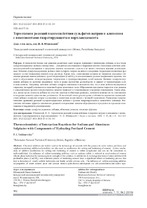Термохимия реакций взаимодействия сульфатов натрия и алюминия с компонентами гидратирующегося портландцемента
Another Title
Thermochemistry of Interaction Reactions for Sodium and Aluminum Sulphates with Components of Hydrating Portland Cement
Bibliographic entry
Юхневский, П. И. Термохимия реакций взаимодействия сульфатов натрия и алюминия с компонентами гидратирующегося портландцемента = Thermochemistry of Interaction Reactions for Sodium and Aluminum Sulphates with Components of Hydrating Portland Cement / П. И. Юхневский // Наука и техника. – 2018. – № 2. - С. 142-145.
Abstract
В технологии бетона для решения различных задач широко применяют химические добавки, в том числе сульфатсодержащие добавки-электролиты – ускорители схватывания и твердения цемента. Механизм действия добавок-ускорителей схватывания и твердения цемента достаточно сложен и не может считаться надежно установленным. Влияние сульфатсодержащих добавок типа сульфата натрия сводится к ускорению гидратации силикатных фаз цемента за счет повышения ионной силы раствора. Кроме того, существенное влияние на твердение оказывают обменные реакции аниона добавки с фазой портландита (Са(ОН)2) и алюминатными фазами твердеющего цемента, что ведет к образованию легкорастворимых гидроксидов и труднорастворимых солей кальция. Влияние сульфатсодержащих добавок на свойства цементного теста и камня достаточно разнообразно и зависит от концентрации соли и вида катиона. Например, действие добавки сульфата алюминия осложняется тем, что в воде добавка подвергается гидролизу, который усиливается в щелочной среде цементного теста. Образование продуктов гидролиза и их реакция с алюминатными фазами и портландитом цемента приводят к существенному ускорению схватывания. Таким образом, несмотря на схожесть добавок по участию анионов в обменных реакциях, механизм влияния их на схватывание и твердение цемента существенно различается. В настоящей статье рассмотрены особенности механизма взаимодействия добавок сульфатов натрия и алюминия в цементных композициях с позиций термохимии. Приведены термохимические уравнения реакций сульфатсодержащих добавок с фазами гидратирующегося цементного клинкера. Рассчитаны тепловые эффекты химических реакций и определено влияние образующихся продуктов на процессы схватывания и твердения портландцемента.
Abstract in another language
Chemical additives are widely used in the technology of concrete with the purpose to solve various problems and sulphate-containing additives-electrolytes are also used as accelerators for setting and hardening of cement. Action mechanism of additive accelerators for setting and hardening of cement is rather complicated and can not be considered as well-established. An influence of sulfate-containing additives such as sodium sulfate is reduced to acceleration of cement silicate phase hydration by increasing ionic strength of the solution. In addition to it, exchange reactions of anion additive with portlandite phase (Ca(OH)2) and aluminate phases of hardening cement have a significant effect on hardening process that lead to formation of readily soluble hydroxides and hardly soluble calcium salts. The influence of sulfate-containing additives on properties of water cement paste and cement stone is quite diverse and depends on salt concentration and cation type. For example, the action of the aluminum sulphate additive becomes more complicated if the additive is subjected to hydrolysis in water, which is aggravated in an alkaline medium of the water cement paste. Formation of hydrolysis products and their reaction with aluminate phases and cement portlandite lead to a significant acceleration of setting. Thus, despite the similarity of additives ensuring participation of anions in the exchange reactions, the mechanism of their influence on cement setting and hardening varies rather significantly. The present paper considers peculiar features concerning the mechanism of interaction of sodium and aluminum sulfate additives in cement compositions from the viewpoint of thermochemistry. Thermochemical equations for reactions of sulfate-containing additives with phases of hydrated cement clinker have been given in the paper. The paper contains description how to calculate thermal effects of chemical reactions and determine an influence of the formed products on the setting and hardening of Portland cement.
View/
Collections
- №2[11]

